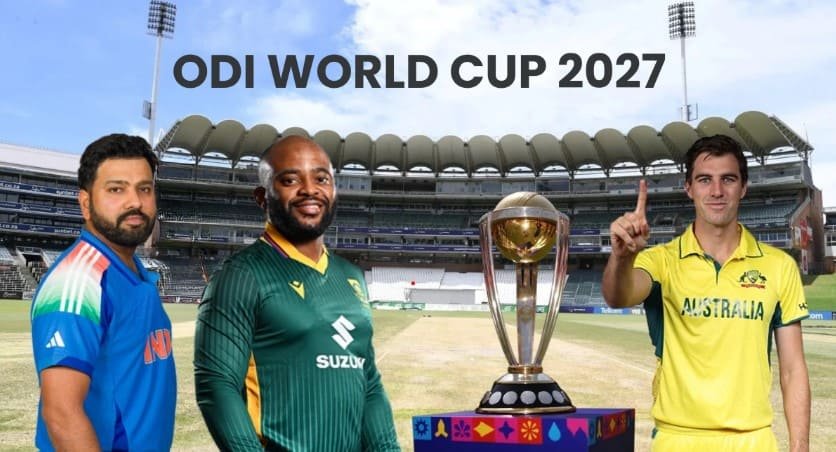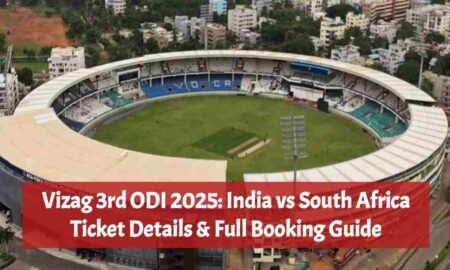The 2027 ICC Men’s ODI World Cup is all set to return to Africa after 24 years, bringing with it a wave of excitement and joy for cricket fans.

The tournament, to be held in October–November 2027, will feature 14 teams, 54 matches, and three hosting nations — South Africa, Zimbabwe, and Namibia.
This will be the first time since the memorable 2003 edition that Africa will stage cricket’s biggest 50-over tournament. And this time, Namibia joins the party, making its debut as a World Cup host — a proud moment for a country that has been steadily rising in international cricket.
Tournament Format
The 2027 ODI World Cup will follow a two-group format, unlike the 2019 and 2023 editions.
- 14 teams will be divided into two groups of seven.
- Each team will play all others in its group once.
- The top three teams from each group will progress to the Super Six stage.
- Points against other qualifying teams will carry forward.
- The top four from the Super Six will move into the semi-finals, followed by the grand final.
This format ensures more competitive matches, reduces dead rubbers, and increases chances for Associate teams to shine.
Venues in South Africa (44 Matches)
Cricket South Africa (CSA) has confirmed eight iconic stadiums as host venues. Each ground brings its own character — from the high-scoring Wanderers to the scenic Newlands.
| City | Stadium Name | Known For |
|---|---|---|
| Johannesburg | Wanderers Stadium | High-scoring thrillers, huge capacity |
| Pretoria | Centurion Park | Pace-friendly track, night matches |
| Cape Town | Newlands Cricket Ground | Scenic beauty with Table Mountain views |
| Durban | Kingsmead Cricket Ground | Swing-friendly coastal conditions |
| Gqeberha | St George’s Park | Oldest Test venue in South Africa |
| Bloemfontein | Mangaung Oval | Balanced wickets, batting-friendly |
| East London | Buffalo Park | Smaller ground, high scoring games |
| Paarl | Boland Park | Warm weather, spin-friendly pitches |
Venues in Zimbabwe & Namibia (10 Matches)
While South Africa takes the lion’s share of fixtures, Zimbabwe and Namibia will jointly host 10 matches.
- Zimbabwe:
- Harare Sports Club (Harare)
- Queens Sports Club (Bulawayo)
- Namibia (Hosting World Cup matches for the first time):
- United Ground (Windhoek)
- Namibia Cricket Ground (Windhoek)
This move is historic as Namibia becomes only the 13th country ever to host World Cup matches. It’s a major step for African cricket development and a reward for Namibia’s impressive performances in recent ICC tournaments.
The exact match fixtures will be released by ICC closer to the event,
Why This World Cup Will Be Special
- Return to Africa – The last African World Cup in 2003 was unforgettable. This edition promises to be bigger, with more teams and more matches.
- Namibia’s Debut as Host – A landmark moment for Associate cricket nations. Hosting matches will not only boost local infrastructure but also inspire the next generation of Namibian cricketers.
- Balanced Format – The return of the Super Six stage means fewer dead matches and more competitive cricket till the very end.
- Diverse Conditions – From the fast-paced pitches of Johannesburg to spin-friendly Paarl and coastal swing in Durban, teams will face a variety of challenges.
- Fan Experience – South Africa’s world-class stadiums, combined with Zimbabwe’s cricketing culture and Namibia’s fresh hosting energy, will make this a carnival for cricket lovers.
In Shorts:
The 2027 ODI World Cup is shaping up to be a landmark event — a blend of tradition, history, and fresh opportunities. With South Africa hosting the majority of games, Zimbabwe adding its rich cricketing flavor, and Namibia stepping up as a new host, fans can expect a World Cup that is not just about cricket but also about expanding the sport’s horizons.
As we await the official fixture list, one thing is certain: the cricket world will turn its eyes to Africa in 2027, and the stage is set for an unforgettable tournament.








